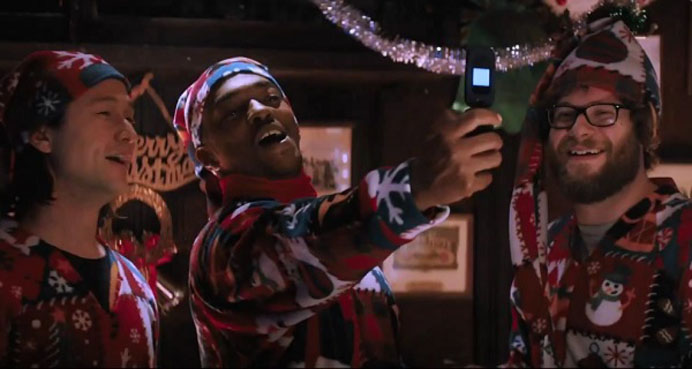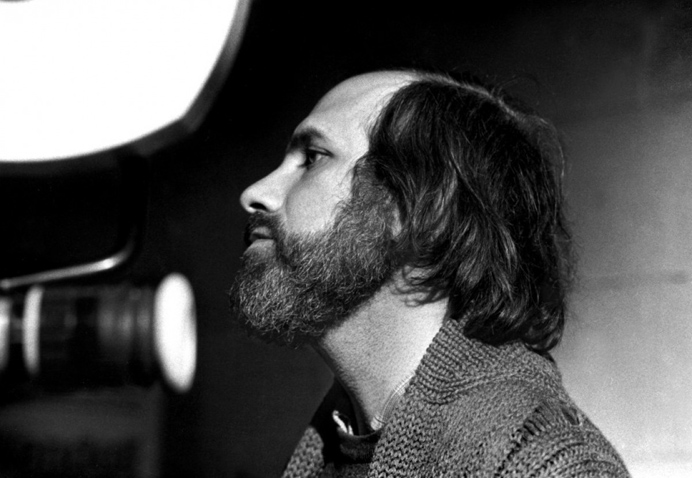
The Night Before (2015)
Dir. Jonathan Levine
Written by Jonathan Levine, Kyle Hunter, Ariel Shaffir, and Evan Goldberg
101 min.
Spoiler-free.
Caught a free advance screening of this last night. Just made it, in fact—the two people behind me were the last of the 250 or so admitted. And behind them, the line stretched far down the rest of the long Manhattan block and then back up alongside itself, kind of like what the snake in the game Snake sometimes has to do. I’d say at least as many didn’t get to see it as got to see it.
The line, and subsequent audience, was quite diverse—age and race all over the place, gender right down the middle. I’d assumed this would be an 18-35 white boy crowd, with maybe a smattering of dragged-along girlfriends who don’t mind a Seth Rogen vehicle here or there, but nope—it seems the combo of goofy and brash Rogen, boyish and sensitive Joseph Gordon-Levitt, and absurdly underrated and capable Anthony Mackie is a brilliant one, as far as widespread appeal.
Who knows what the actual demographic of paying customers will be, or what critics will think of the movie, or what the box office will be, but, if the crowd I saw it with is any indication, the word-of-mouth will be good, and this movie will be enjoyed by most who do see it. There was even a bit of applause at the end, which should not be construed to mean that some people will downright love this movie and that it’ll become a cult Christmas classic—it’s simply that this movie is so not-as-bad-as-you’d-think that, by the end, applause seems kinda justified.
As far as my own enjoyment with it, my expectations were low, and they were more than surpassed. I laughed during pretty much every scene I was supposed to, and I was touched by pretty much every scene I was supposed to be touched by. But, and maybe this is just me, but in my head, I kept hearing jokes, or tag lines to jokes, that should have been gone for but weren’t. Short sentences here and there that could’ve taken B scenes to A+ heights. And pretty much every scene suffers from this. Maybe the actors needed an Apatow, or an Adam McKay, or a David Gordon Green, shouting spur-the-moment new lines from behind the camera for them to say, as you often see in DVD bonus features. That certainly worked for Knocked Up, and Stepbrothers, and Pineapple Express. And who knows, maybe Jonathan Levine did in fact do that here. But whatever the case, it just feels like it wasn’t done, and as a result, the film’s comedic heights only go about ceiling level.
What Levine does excel at though is getting three-dimensionality out of his actors. The performances out of damn near everyone here are unusually good. Even people with only a handful of lines get across a level of depth that seems damn near impossible given the lines that they’ve been given. People really feel like people, which is refreshing, as so often movies of this ilk treat that as an afterthought, focusing too heavily on humor instead. And that’s one thing this movie has over the three I just mentioned—sure, those are better movies as far as pure enjoyment goes, but the characters in them seem flat by comparison, mere mouthpieces for jokes. And that really makes me wanna check out Levine’s previous work, of which I’ve seen none, and from what I understand are dramedies rather than comedies, so, less pressure to be funny, which probably works better for him.
The story itself is kinda simple, but clever. Essentially it’s just a three-guys trying-to-get-to-a-party plot, a la Superbad. But here, there isn’t really much standing in their way, and the stakes aren’t high. Sure, some problems occur along the way, but the problems are pretty small and surmountable. Which sounds like it could be dumb, or not exciting enough, but oddly enough, it kinda works—it leaves more room for interpersonal drama, and even allows for each of the characters to experience beats of internal drama as well.
Some of the story does feel quite forced though. There’s some Christmas Carol-esque past, present, future stuff that is tangental the plot and doesn’t really feel necessary. And there’s a scene where they shoehorn in an allusion to How The Grinch Stole Christmas that doesn’t really land or make sense at all. And the film itself is bookended by tongue-in-cheek storybook narration. It’s almost as though they—or likely, a studio exec—didn’t feel the script was Christmas-y enough, and requested another rewrite be done to make it more so.
Had the Christmas tree that is this film been less covered with random ornaments that clash and don’t belong, I do think this could’ve been somewhat of a classic. Not a watch-ever-year one like Elf or It’s A Wonderful Life (or one of my personal favorites, Holiday Affair with Robert Mitchum) but maybe one you could watch every few. As it stands, it’s a movie you probably don’t ever need to see more than once or twice, and don’t really need to see in theaters at all. But, if you’re in the mood to go with your family or friends to a holiday movie this year, you could do way worse. So fuck it, see it.
3 1/2 out of 5 Codys.
